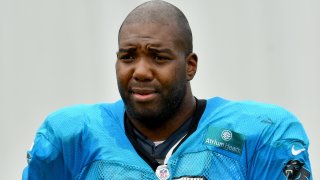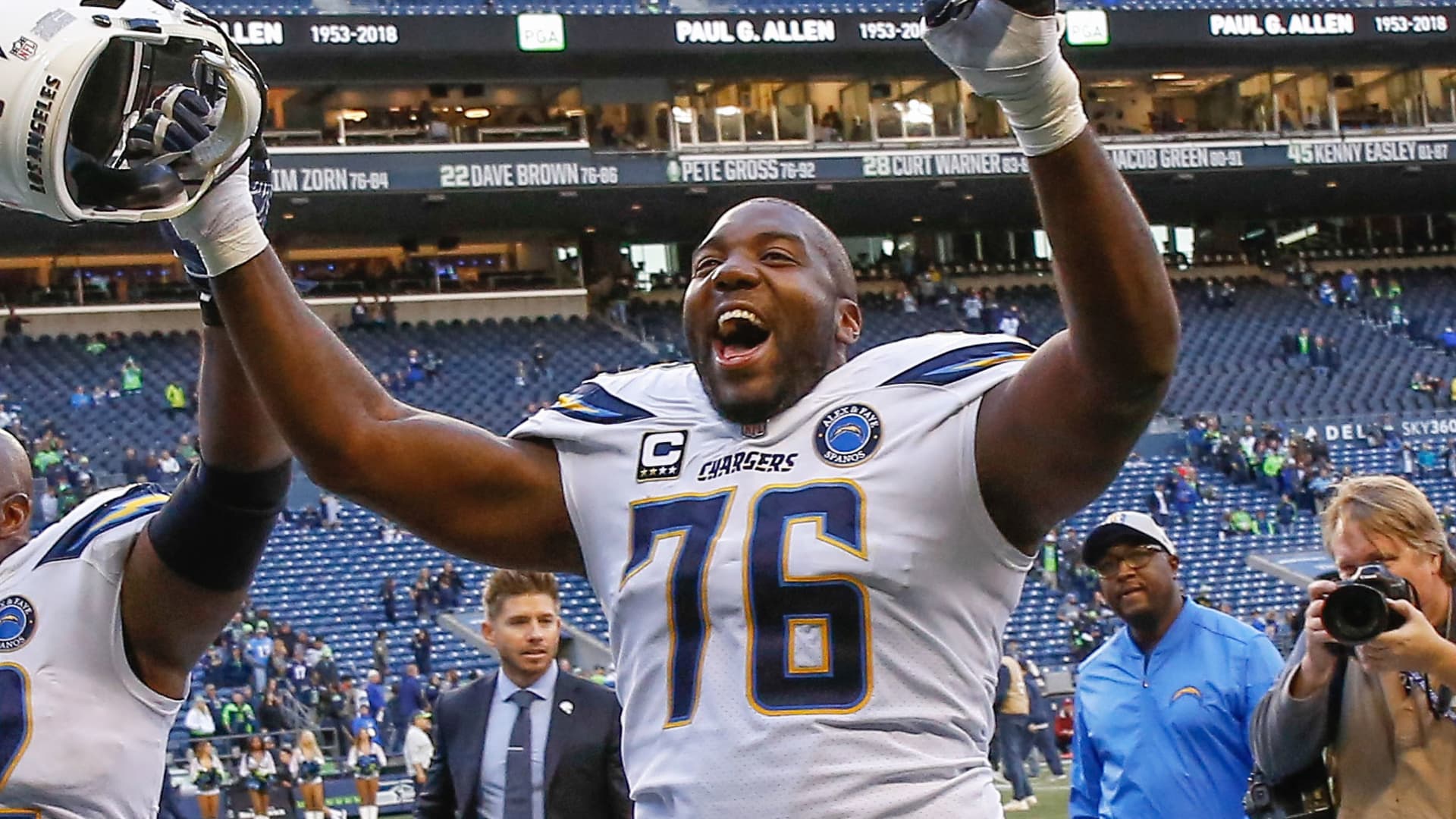
Russell Okung #76 of the Carolina Panthers
- The Carolina Panthers offensive linemen agreed to have roughly $6 million of his salary diverted to mobile payment company Strike to purchase bitcoin investments.
- With the cryptocurrency's price regularly reaching new highs, other pro athletes could be triggered to start investing in bitcoin.
It's often referred to as a new form of gold, and now Carolina Panthers offensive linemen Russell Okung is making a massive bet on bitcoin.
After a nearly two-year battle, Okung finally had his wish granted and will have his salary diverted to purchasing bitcoin with the assistance of mobile payment firm Strike.The agreement that allows the Panthers to pay part of Okung's $13 million salary to Strike so it can be converted to bitcoin.
"Money is more than currency; it's power," said Okung in a statement. "The way money is handled from creation to dissemination is part of that power. Getting paid in bitcoin is the first step of opting out of the corrupt, manipulated economy we all inhabit."
The National Football League and its players' union were both unaware of the agreement until Tuesday's announcement but the parties didn't attempt to void or officially sign off on Okung's agreement, which was handled internally by the Panthers.
When discussing the league's stance regarding the arrangement on Wednesday, an NFL spokesperson Brian McCarthy told CNBC via email, "There wasn't anything to sign off on. The clubs pay the players in US dollars. What the players or his agents do with the money is up to them."
Money Report
To be clear, the Panthers are not paying Okung directly in bitcoin. Instead, the team will divert roughly $6.5 million from Okung's salary to Strike, which will then presumably take a fee and process bitcoin transactions for Okung, a longtime advocate of the currency.
Strike did not respond to a CNBC request to confirm the transaction fees associated with Okung's agreement.
Bitcoin is trading at more than $27,000, so Okung will receive approximately 240 coins at that value. Since his playing days with the Los Angeles Chargers in 2019, Okung lobbied to have his salary replaced with bitcoin.
"He's hoping long-term that the price of bitcoin is going up," Chris Matta, managing director of sales and trading at bitcoin and cryptoasset firm 3iQ, told CNBC on Tuesday. "And this move is a show of his support and long-term bullishness for bitcoin growing even more from here."
It's like gold, but it's not gold
Bitcoin was introduced in 2008 and produced fortunes for some when a single bitcoin surged from under $1,000 to nearly $20,000 in 2017. That sparked a bull market in new crypto-based funds.
Bitcoin has since gained popularity with Covid-19 disrupting economies as investors look for safekeeping during the pandemic. For decades, gold was the usual safety net for investors, but Matta said bitcoin is now viewed as an alternative.
"It's become hugely attractive as a hard asset, especially during Covid-19 and all the consumer concerns about the global economy and geopolitical environment," Matta said, referencing billionaire hedge fund manager Paul Tudor Jones' comments to invest more in bitcoin.
"The new digital gold, as it's called," Matta added. "It's brought bitcoin to the forefront of investment portfolios this year, and there is a ton of interest around it as a result."
Matta said Okung's bitcoin would likely be placed in offline digital wallets referred to as "cold storage." The move gives Okung more protection from potential hackers looking to steal the currency from his account. Bitcoin accounts aren't protected like bank accounts, which are FDIC-insured.
"Keeping it offline is a much safer way, especially for someone like Russ who is outspoken about bitcoin," Matta said. "Anyone who is vocal in the bitcoin space is a target for cyber-hacking."

Risky move?
But like any investment, Okung, 32, is taking a considerable risk.
Drew Hawkins, CEO of Edyoucore, a financial consulting firm, said the frequent fraudulent activity surrounding bitcoin is a concern and added, "a lot of guys need to understand what it is and how it works and what it is not.
"It's a risk in terms of what they're going to get in their hands with guaranteed dollars from a contract versus of taking chances with regards to what this value of bitcoin will or will not be," Hawkins said.
Though approaching fresh highs, volatility still haunts bitcoin due to its steep corrections history, which in 2017 dropped the trading price to $3,000 for a single coin.
On Monday, Mark Newton of Newton Advisors told CNBC's "Trading Nation" his estimations show bitcoin's current cycle "peaking out in early January." He said there could be opportunities to start buying the cryptocurrency at lower prices by then.
"Bitcoin has been an extremely volatile asset," said Matta. "But over the longer term, it's probably been the best performing asset of the last 10 years. But if you don't know what you're doing and not investing in this thing long-term, there will be a lot of volatility in-between."
Added Hawkins: "People have done well and made a lot of money off of it, but you've also had an equal amount of situations that ended up not panning out to what somebody was anticipating or ended up in some substantial losses."
Are more athletes going bitcoin?
Strike is also coordinating more arrangements emulating Okung's with players from the Brooklyn Nets and New York Yankees, according to bitcoin news site CoinDesk. The site did not name the players involved.
Matta said Okung's move would provide more credibility for bitcoin, and that could trigger even more athletes to invest in digital currencies. Potential investors can also purchase bitcoin through other mobile payment apps, including PayPal, Cash App and Square.
"Covid-19 hyper-charged the growth of bitcoin," Matta said. "I think this would've happened to bitcoin anyway; it just may have taken a few more years to get to this point."
-- CNBC's Hugh Son contributed to this report.
Correction: A single bitcoin surged from under $1,000 to nearly $20,000 in 2017. An earlier version misstated the year. This story was updated to reflect the NFL's comments on the matter.






